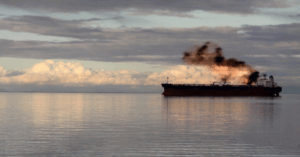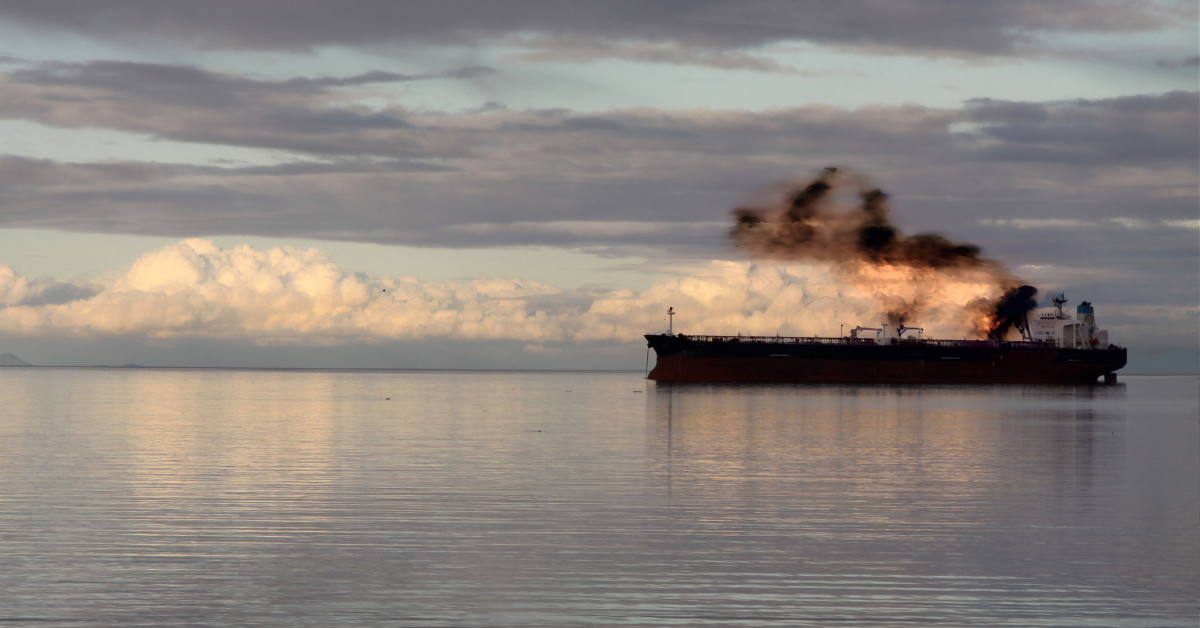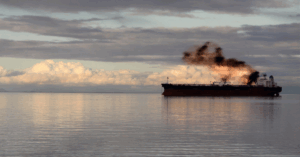
Port Of Los Angeles Sees 9% Import Drop Amid U.S.–China Tariff Tensions
June 17, 2025
Vane Brothers & Shell Deliver First Biofuel To Cruise Ship At Manhattan Terminal
June 17, 2025

Two large oil tankers collided near the Strait of Hormuz on Tuesday, causing a fire and forcing an emergency crew evacuation.
The incident happened around 15 nautical miles off the coast of the United Arab Emirates in the Gulf of Oman, an area that has become increasingly tense due to ongoing conflict between Iran and Israel.
The tankers involved were the Front Eagle, operated by the Oslo-listed company Frontline, and the Adalynn, a Suezmax-class ship owned by India-based Global Shipping Holding Ltd.
According to maritime tracking service TankerTrackers.com, Front Eagle was carrying 2 million barrels of Iraqi crude oil and heading to Zhoushan, China. The Adalynn had no cargo on board and was on its way to the Suez Canal in Egypt.
After the collision, a fire broke out on Front Eagle, but it was quickly extinguished. Frontline confirmed there were no injuries among the crew and no oil pollution detected. The company also said it was aware of reports of a fire on the Adalynn, though further details were not provided.
The United Arab Emirates coastguard carried out a rescue operation and evacuated 24 crew members from the Adalynn. They were brought safely to Khor Fakkan port, and no casualties were reported.
British maritime security company Ambrey said the incident was “not security-related” even though it happened during a time of high regional tension. Since Friday, Iran and Israel have been exchanging missile strikes, raising serious concerns about the safety of shipping in the area.
TankerTrackers.com said on X (formerly Twitter) that the Front Eagle was moving south at a speed of 13.1 knots when it made a starboard (right) turn. This maneuver led to a collision with the aft port (rear-left) side of the Adalynn, which was moving southeast at 4.8 knots.
The Strait of Hormuz is a crucial passage linking the Persian Gulf with the Gulf of Oman and the Arabian Sea. It handles about one-fifth of the world’s oil trade, with an estimated 17.8 million to 20.8 million barrels of crude, condensates, and fuel products passing through daily, based on data from Vortexa.
Recently, commercial ships in the region have been experiencing electronic disruptions affecting navigation systems. The U.S.-led Combined Maritime Forces’ JMIC (Joint Maritime Information Center) issued an advisory saying that reports of such interference were traced to areas near Iran’s Port of Bandar Abbas and other parts of the Gulf.
Iran has previously threatened to block the Strait of Hormuz in response to pressure from Western countries. Since open hostilities began with Israel, Iranian officials have again raised that possibility.
However, Iran has not commented on the latest tanker collision or on the reports of electronic interference.
Since 2019, multiple ship attacks in the region have been blamed on Iran, particularly after the U.S. pulled out of the 2015 nuclear deal under President Donald Trump.
Experts believe that while Iran is likely to continue applying pressure in the region, it may try to avoid direct conflict with the United States due to its limited military strength.
References: Aljazeera, Reuters
Source: Maritime Shipping News


